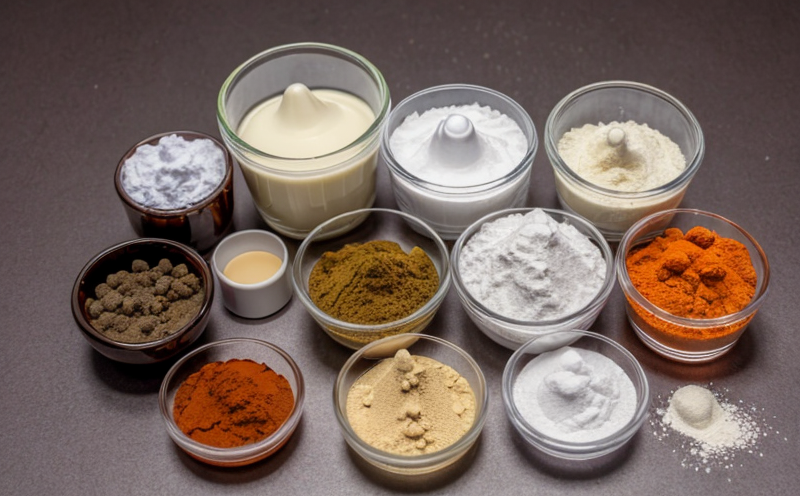Magnesium Stearate Lubricity Testing
Magnesium stearate is a widely used lubricant and anti-adhesive agent in pharmaceutical manufacturing. Its role is to ensure that tablets, capsules, or other drug formulations can be easily compressed into desired shapes without sticking to equipment during processing. The lubricity of magnesium stearate plays a crucial part in the quality control of pharmaceutical products.
During the tablet production process, magnesium stearate acts as a barrier between the powder mixture and the metal dies. If the lubricity is insufficient, it could lead to poor compression efficiency or even caking issues within the formulations. Therefore, testing magnesium stearate for its lubricity ensures that the final product meets both regulatory standards and manufacturing specifications.
The lubricity of magnesium stearate can be evaluated using several methods including tribological tests such as the rotating disk test (ASTM E261) or the ring compression test. These tests simulate the conditions under which magnesium stearate is used in pharmaceutical applications, providing a realistic assessment of its performance.
For accurate testing, samples are prepared by dispersing a known quantity of magnesium stearate on a rotating disk or placed between two parallel plates subjected to compressive forces. The friction coefficient and adhesion force are measured under controlled conditions. This information is then used to determine the lubricating properties of the magnesium stearate.
It’s important to note that the quality of magnesium stearate can vary depending on factors such as its purity, particle size distribution, and moisture content. Therefore, a comprehensive testing protocol should be followed to ensure consistent results. Our laboratory employs advanced analytical techniques including X-ray diffraction (XRD) for crystal structure analysis and scanning electron microscopy (SEM) for particle morphology assessment.
The test results are typically reported in terms of the friction coefficient or adhesion force measured during the tribological tests. Compliance with international standards such as ASTM E261 ensures that magnesium stearate meets quality benchmarks recognized worldwide. This not only enhances product reliability but also facilitates easier compliance with regulatory requirements, thereby reducing potential risks and costs associated with non-conformance.
In conclusion, magnesium stearate lubricity testing is essential for ensuring the integrity of pharmaceutical formulations. By rigorously evaluating the lubricating properties of magnesium stearate, we can guarantee that our clients produce high-quality products that meet international standards and regulatory expectations.
Why Choose This Test
Selecting the appropriate testing method is critical in ensuring product quality and compliance. Here are several reasons why choosing magnesium stearate lubricity testing is beneficial:
- Enhanced Product Quality: Ensures that tablets or capsules can be easily compressed without sticking to equipment, leading to consistent and reliable product performance.
- Regulatory Compliance: Adherence to international standards such as ASTM E261 helps in meeting regulatory requirements, reducing the risk of non-compliance issues.
- Cost Efficiency: By preventing potential defects early in the production process, magnesium stearate lubricity testing can save time and money on rework or scrap.
- Risk Management: Early detection of any quality issues related to magnesium stearate helps minimize potential risks associated with product recalls or customer dissatisfaction.
- Patient Safety: Ensuring that the lubrication properties of magnesium stearate are optimal reduces the chances of adverse effects on patient health.
- Innovation Support: Accurate testing data can provide valuable insights for R&D teams to improve formulations and processes continuously.
The reliability and accuracy provided by our laboratory ensure that pharmaceutical companies can trust their supply chain, fostering a robust quality management system.
International Acceptance and Recognition
- ASTM E261: This standard specifies the procedure for determining the lubricating properties of magnesium stearate using the rotating disk test. It is widely accepted in North America and Europe.
- Pharmacopoeia of the People's Republic of China (ChP): The ChP also includes guidelines for evaluating magnesium stearate, ensuring its suitability for use in Chinese pharmaceutical industries.
- Japanese Pharmacopoeia: This standard provides specifications that ensure magnesium stearate is safe and effective for Japanese pharmaceutical applications.
- European Pharmacopoeia (Ph. Eur): Ph. Eur guidelines are essential for ensuring compliance with EU regulations, making them a critical reference worldwide.
- International Organization for Standardization (ISO): ISO standards provide a harmonized approach to quality management systems that pharmaceutical companies can adopt globally.
The acceptance of these standards by various countries underscores the importance and reliability of magnesium stearate lubricity testing in ensuring product consistency and safety across international borders.
Use Cases and Application Examples
Magnesium stearate is a vital component in pharmaceutical formulations, particularly for improving the manufacturability of tablets. Here are some real-world use cases:
Tablet Production: In tablet manufacturing, magnesium stearate acts as a lubricant to prevent sticking and facilitate easy ejection from presses. Proper lubricity testing ensures that the tablets have consistent hardness and disintegration times.
Capsule Coating: For coated capsules, magnesium stearate can be used in the coating formulation to enhance flowability and prevent adhesion during encapsulation processes.
Dry Powder Inhalers (DPIs): In DPI formulations, magnesium stearate is added as a lubricant to ensure that the drug particles are easily aspirated by patients. Lubricity testing ensures that the inhaler delivers accurate dosages consistently.
Lotion and Cream Formulations: While not pharmaceutical in nature, magnesium stearate can be used in topical formulations to improve spreadability and reduce tackiness.
In all these applications, ensuring optimal lubricity is crucial for product performance. Our laboratory provides comprehensive testing services tailored to meet the specific needs of each application, helping our clients achieve consistent quality outcomes.





